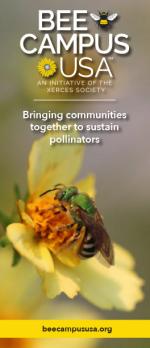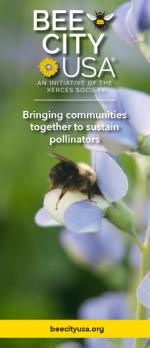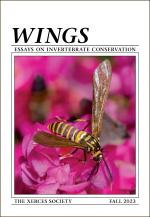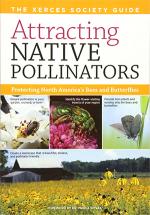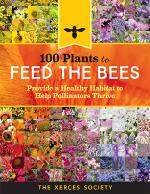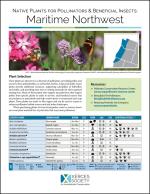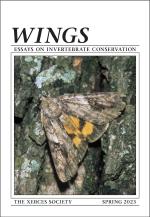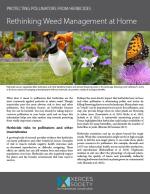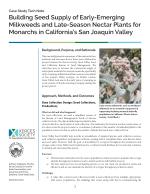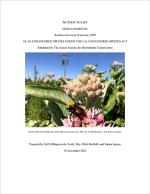As a science-based organization, the Xerces Society produces dozens of publications annually, all of which employ the best available research to guide effective conservation efforts. Our publications range from guidelines for land managers, to brochures offering overviews of key concepts related to invertebrate conservation, from books about supporting pollinators in farmland, to region-specific plant lists. We hope that whatever you are seeking—whether it's guidance on making a home or community garden pollinator-friendly, advice on developing a local pesticide reduction strategy, or detailed information on restoring habitat—you will find it here!
Find Publications
Use the search functions to sort by publication type (books, guidelines, fact sheets, etc.), location, and/or subject (agriculture, gardens, pollinators, pesticides, etc.).
The goal of this tool is to evaluate pollinator habitat at a given urban, suburban, or rural site and identify areas for improvement. This process will also help users prioritize the most essential next steps to take for pollinators at the site.
Bringing Communities Together to Sustain Pollinators
Bee Campus USA brings college communities together to sustain pollinators by increasing the abundance of native plants, providing nest sites, and reducing the use of pesticides. Affiliates of Bee Campus USA also work to inspire others to take steps to conserve pollinators through education and outreach. Learn how your college can join Bee Campus USA.
Bringing Communities Together to Sustain Pollinators
Bee City USA brings communities together to sustain pollinators by increasing the abundance of native plants, providing nest sites, and reducing the use of pesticides. Affiliates of Bee City USA also work to inspire others to take steps to conserve pollinators through education and outreach. Learn how your community can join Bee City USA.
Essays on Invertebrate Conservation
Moths are all around us. They share our natural areas and gardens, and sometimes they share our food crops, and even our clothes. Love them or despise them, moths play profoundly important roles in our environment—as pollinators; as food for songbirds, bats, and other wildlife; as part of the clean-up crew that recycles organic waste; and more—and they deserve our conservation attention.
How you can attract and protect beautiful, beneficial insects
Protect and nurture the best-loved of garden guests: butterflies, nature’s kaleidoscopes with wings. The Xerces Society introduces you to a variety of butterflies who need our help, and provides suggestions for native plants to attract them, habitat designs to help them thrive, and garden practices to accommodate all their stages of life.
Protecting North America’s Bees and Butterflies
Attracting Native Pollinators is Illustrated with hundreds of color photographs and dozens of specially created illustrations across four sections: pollinators and pollination, taking action, bees of North America, and creating a pollinator-friendly landscape. Read it for your own enjoyment or use it as a teaching guide to inform others.
Provide a Healthy Habitat to Help Pollinators Thrive
100 Plants to Feed the Bees offers browsable profiles of 100 common flowers, herbs, shrubs, and trees that attract bees, butterflies, moths, and hummingbirds.
Create a Healthy Habitat to Sustain America’s Most Beloved Butterfly
100 Plants to Feed the Bees provides at-a-glance profiles of plants that provide monarchs with nourishment. The listed plants are all commercially available, and range from milkweeds to flowering plants, shrubs, and trees that provide nectar for the adult butterfly, including those that sustain monarchs in their great migration.
Identify native plants that attract native pollinators and beneficial insects in the Maritime Northwest region.
Essays on Invertebrate Conservation
At the core of wildlife conservation is the need to ensure that animals have somewhere to feed, breed, and shelter—that is, habitat. Making that habitat the best it can be may mean balancing many issues, which sometimes include human needs. In this issue of Wings, our writers consider the challenges of light pollution, honey bees in North America, and facilitating agriculture in urban areas.


